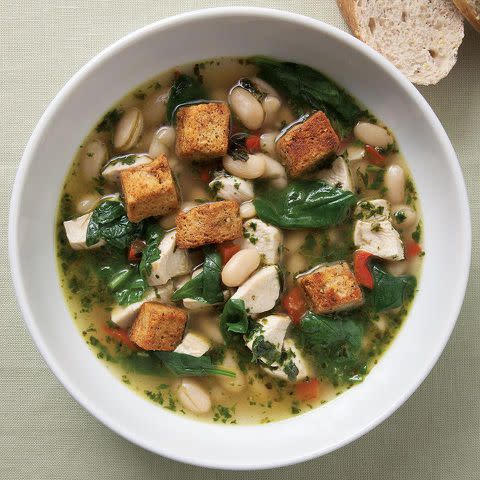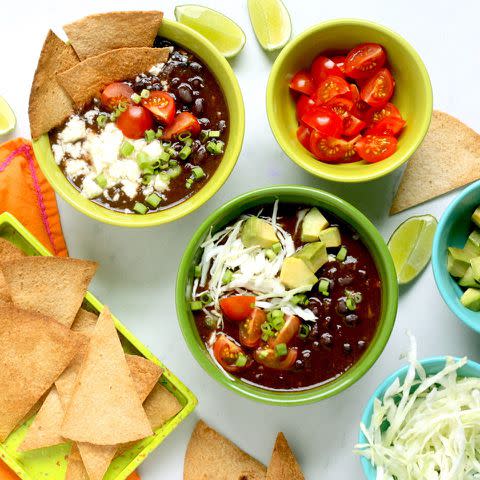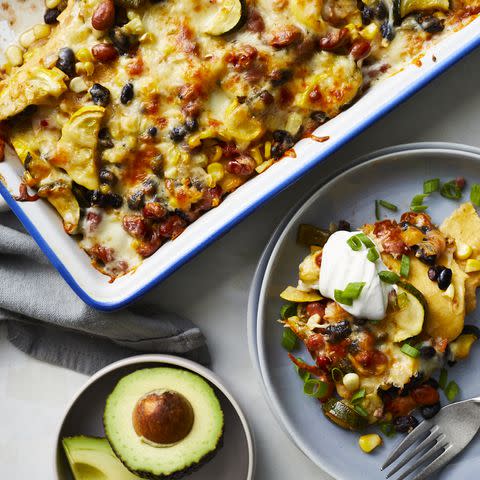7-Day No-Sugar High-Fiber Meal Plan for Diabetes
Read on for the details on this meal plan that's packed with fiber to help you feel full and satisfied all afternoon.

Reviewed by Dietitian Jessica Ball, M.S., RD
If you've been diagnosed with diabetes, you probably have heard that you need to watch your carbohydrates (or carbs for short). But did you know there is one type of carbohydrate that actually helps you manage your diabetes? Say hello to the magical carbohydrate: fiber. Fiber is a type of carbohydrate that not only helps keep you regular, but it also helps with keeping your blood sugar—and your weight—in check. It can help you feel full, improve your digestion and help reduce your risk of heart disease, too.
According to the 2020-2025 Dietary Guidelines for Americans, adults 19 years and older should consume at least 28 to 34 grams of fiber per day depending on their age and sex. This is a far cry from the 17 gram average that most Americans currently get in their typical eating patterns.
But what exactly is fiber, and how do you get more in your diet? Technically, there are two types of fiber: soluble and insoluble. Soluble fiber turns to a gel because it dissolves in water while insoluble fiber doesn't dissolve in water and helps add bulk to stools for easier passing. Soluble fiber is present in foods like oats, fruits and flaxseed, while insoluble fiber is found in foods like nuts, brown rice and whole-wheat flour. Both types are important for digestion and there is no need to prioritize one type over the other as both have been shown to help with blood glucose control.
For those diagnosed with diabetes, there is an additional added benefit to following a high-fiber diet. Studies have shown that people with diabetes who adhere to a high-fiber diet of at least 35 grams per day can improve their blood sugar levels, better regulate their insulin levels and lower their cholesterol and triglyceride levels.
Related: 12 High-Fiber Diet Foods
Best High-Fiber Foods For Diabetes
Beans and lentils
Whole grains (such as oats, quinoa, whole-wheat bread, brown rice, bulgur, freekeh)
Apples
Pears
Bananas
Berries (such as strawberries, blueberries and raspberries)
Dark leafy greens (such as kale, spinach and collards)
Brussels sprouts
Seeds (such as chia, sunflower and pumpkin)
Popcorn
Nuts (such as almonds, walnuts and pistachios)
Sweet potatoes
This meal plan also ditches added sugar, meaning those that are added during processing and natural sugars that are added to sweeten foods, such as maple, honey and coconut sugar. Reducing added sugar intake—especially high-fructose corn syrup—to less than 5% of your total calories has been shown to help improve your blood sugar and reduce the prevalence of diabetes. For that reason, we are skipping added sugar altogether in this meal plan.
In this no-sugar-added, high-fiber meal plan for diabetes, we focus on recipes with whole grains, fruits, vegetables, beans and legumes to create days that have at least 35 grams of fiber. We also set it at 1,500 calories, which is a level at which most will lose weight. If you require more or fewer calories, adjustments for 1,200 calories and 2,000 calories are also listed.
How to Meal-Prep Your Week of Meals
Meal-prep at the beginning of the plan makes it easier for you to follow the meal plan through the week.
Prepare the Overnight Oats with Chia Seeds for breakfasts on Days 1-3.
Make the Roasted Buffalo Chickpeas for snack Day 2-4.
Day 1

Breakfast (390 Calories)
1 serving Overnight Oats with Chia Seeds
A.M. Snack (277 calories)
1 medium pear
1/4 cup unsalted pistachios
Lunch (435 calories)
1 serving Shrimp, Avocado & Feta Wrap
1 small apple
Afternoon Snack (200 calories)
1 cup edamame in pods
Dinner (208 calories)
1 serving Chicken & Spinach Soup with Fresh Pesto
Daily Totals: 1,511 calories, 85 g protein, 160 g carbohydrate, 44 g fiber, 68 g fat, 1206 mg sodium.
To make it 1,200 calories: Omit A.M. snack and reduce to ¾ cup edamame at P.M. snack.
To make it 2,000 calories: Add 2 hard boiled eggs to breakfast, Increase to 2 servings soup at dinner and add 1 serving Almond-Stuffed Dates for evening snack.
Day 2

Breakfast (390 Calories)
1 serving Overnight Oats with Chia Seeds
A.M. Snack (296 calories)
1 small banana
1/4 cup unsalted almonds
Lunch (360 calories)
1 serving Salmon-Stuffed Avocados
1/2 whole-wheat English muffin
Afternoon Snack (109 calories)
1 serving Roasted Buffalo Chickpeas
Dinner (350 calories)
1 serving Loaded Black Bean Nacho Soup
Daily Totals: 1,505 calories, 62 g protein, 156 g carbohydrate, 40 g fiber, 79 g fat, 1,266 mg sodium.
To make it 1,200 calories: Omit A.M. snack.
To make it 2,000 calories: Add 2 scrambled eggs to breakfast, Increase to 1 English muffin at lunch, increase to 2 servings chickpeas at P.M. snack, and add 1 serving Almond-Stuffed Dates for evening snack.
Day 3

Breakfast (390 calories)
1 serving Overnight Oats with Chia Seeds
A.M. Snack (109 calories)
1 serving Roasted Buffalo Chickpeas
Lunch (325 calories)
1 serving Veggie & Hummus Sandwich
Afternoon Snack (124 calories)
1 ½ cups pineapple chunks
Dinner (567 calories)
Daily Totals: 1,514 calories, 68 g protein, 177 g carbohydrates, 39 g fiber, 66 g fat, 1,1376 mg sodium.
To make it 1,200 calories: Omit A.M. and P.M. snacks, reduce to 1 ½ Tbsp pecans at breakfast.
To make it 2,000 calories: Add 2 scrambled eggs to breakfast, increase to 2 servings chickpeas at A.M. snack, and add ¼ cup almonds to P.M. snack.
Day 4

Breakfast (422 calories)
1 serving Peanut Butter-Banana English Muffin
1 hard-boiled egg
A.M. Snack (115 calories)
1/2 cup nonfat plain Greek yogurt
1/2 cup raspberries
1 teaspoon chia seeds
Lunch (378 calories)
1 serving Chickpea "Chicken" Salad
1 slice whole-wheat toast
1 leaf butter lettuce
Make an open-faced sandwich by placing the lettuce on the toast and topping with the Chickpea "Chicken" Salad.
Afternoon Snack (99 calories)
1 serving Lemon-Parm Popcorn
Dinner (476 calories)
1 serving Creamy White Chili with Cream Cheese
2 cups mixed greens with 2 Tbsp. Lemon-Garlic Vinaigrette
Daily Totals: 1,490 calories, 74 g protein, 163 g carbohydrate, 38 g fiber, 60 g fat, 1,820 mg sodium.
To make it 1,200 calories: Omit egg at breakfast and A.M. and P.M. snacks.
To make it 2,000 calories: Increase to 1 cup yogurt and 1 cup raspberries at A.M. snack, increase to 2 serving popcorn at P.M. snack, and add 1 serving 2-Ingredient Peanut Butter-Banana Ice Cream at evening snack.
Day 5

Breakfast (279 calories)
1 serving Muesli with Raspberries
A.M. Snack (84 calories)
1 cup blueberries
Lunch (328 calories)
1 serving leftover Creamy White Chili with Cream Cheese
Afternoon Snack (329 calories)
1 serving Avocado Hummus
½ cup (1.5 oz) baked tortilla chips
Dinner (429 calories)
1 serving Charred Shrimp, Pesto & Quinoa Bowls
Evening Snack (51 calories)
1 serving Watermelon with Lime
Daily Totals: 1,502 calories, 77 g protein, 184 g carbohydrate, 37 g fiber, 56 g fat, 1,619 mg sodium.
To make it 1,200 calories: Omit A.M. and evening snack, reduce to ½ serving hummus and 1 oz chips at P.M. snack.
To make it 2,000 calories: Add 2 hard-boiled eggs to breakfast, 1/3 cup almonds to A.M. snack, and 2 Tbsp. pumpkin seeds to evening snack.
Day 6

Breakfast (361 calories)
1 serving PIneapple Green Smoothie
2 tablespoons natural peanut butter
Add peanut butter to the smoothie before blending.
A.M. Snack (158 calories)
2 hard-boiled eggs
⅛ teaspoon everything bagel seasoning
Lunch (500 calories)
1 serving Black Bean-Quinoa Bowl
Afternoon Snack (113 calories)
1 serving Lime & Parmesan Popcorn
Dinner (372 calories)
1 serving Vegetarian Enchilada Casserole
Daily Totals: 1,503 calories, 62 g protein, 176 g carbohydrates, 39 g fiber, 65 g fat, 1,686 mg sodium.
To make it 1,200 calories: Omit A.M. snack and P.M. snacks.
To make it 2,000 calories: Increase to 2 servings popcorn at P.M. snack, add ¼ cup avocado to dinner, and add 1 serving Peanut Butter-Banana Ice Cream to evening snack.
Day 7

Breakfast (222 calories)
1 serving Everything Bagel Avocado Toast
3/4 cup raspberries
A.M. Snack (308 calories)
1 serving Strawberries & Cottage Cheese
¼ cup walnuts
1 teaspoon chia seeds
Lunch (394 calories)
1 serving Edamame & Veggie Rice Bowl
P.M. Snack (162 calories)
2 clementines
12 almonds
Dinner (343 calories)
1 serving Sheet Pan Chicken Fajita Bowls
Evening Snack (73 calories)
1 serving Tart Cherry Nice Cream
Daily Totals: 1,502 calories, 83 g protein, 157 g carbohydrate, 41 g fiber, 70 g fat, 1,458 mg sodium.
To make it 1,200 calories: Omit A.M. snack.
To make it 2,000 calories: Add 2 scrambled eggs to breakfast, increase to ⅓ cup almonds at afternoon snack, add ¼ avocado at dinner, and increase to 2 servings cherry nice cream at evening snack.

